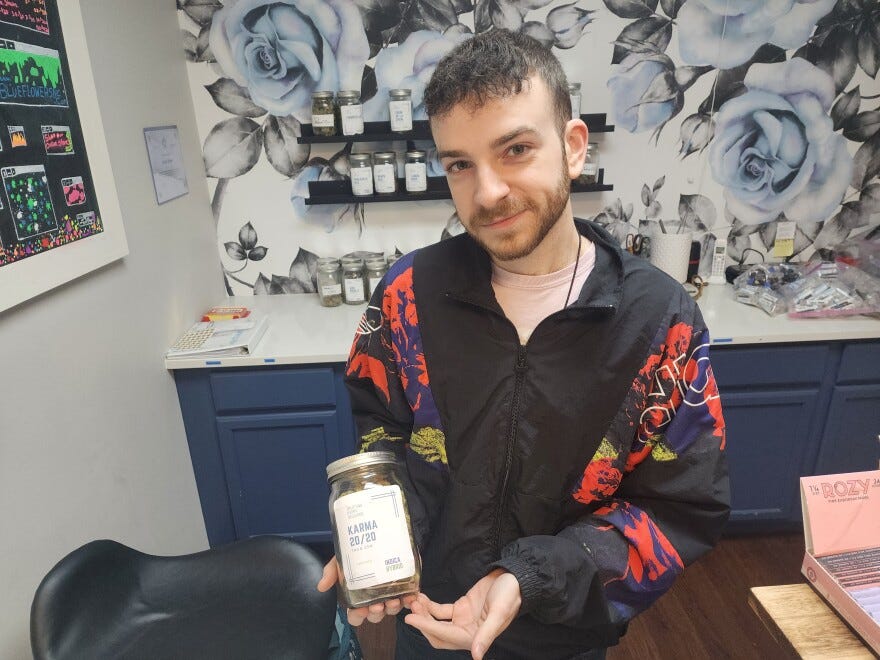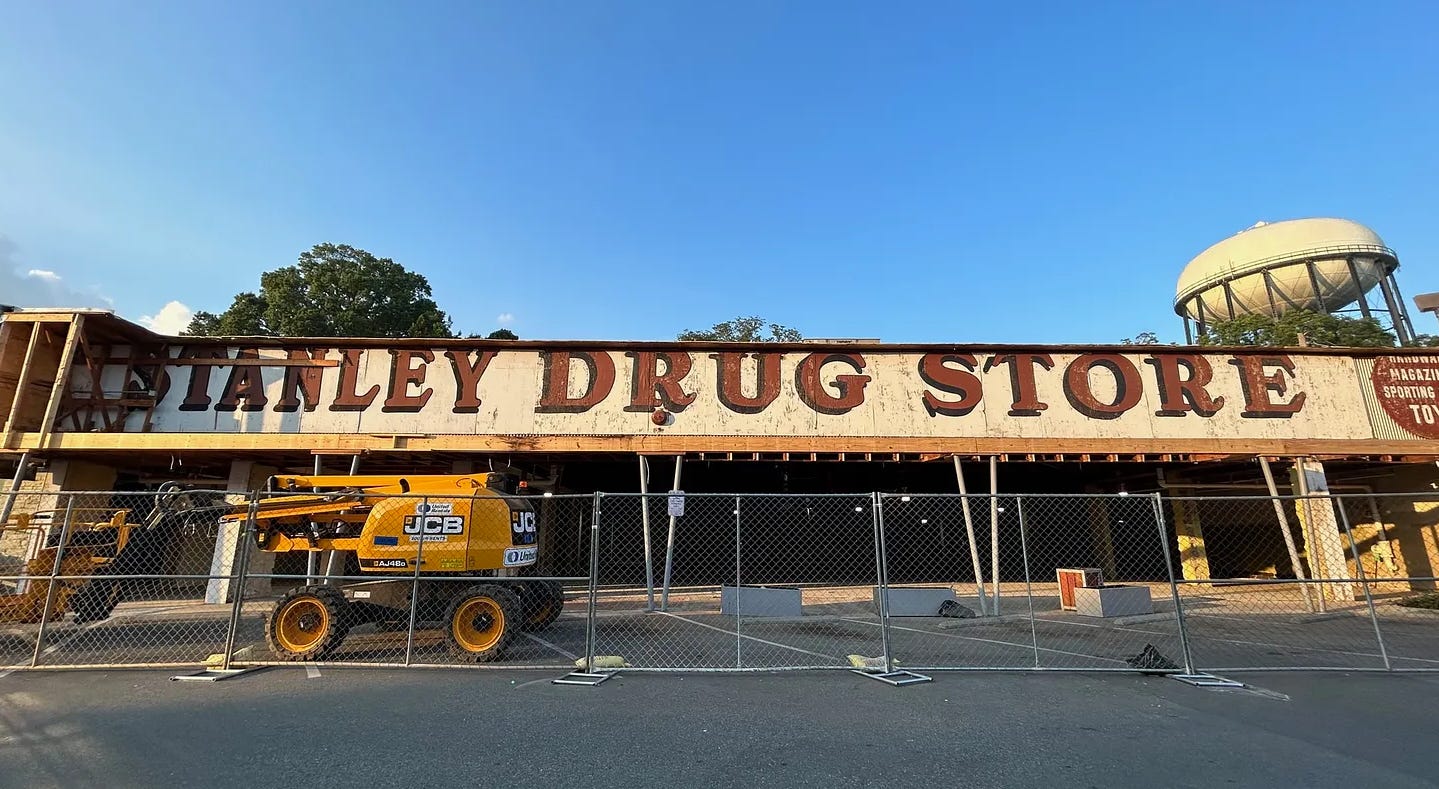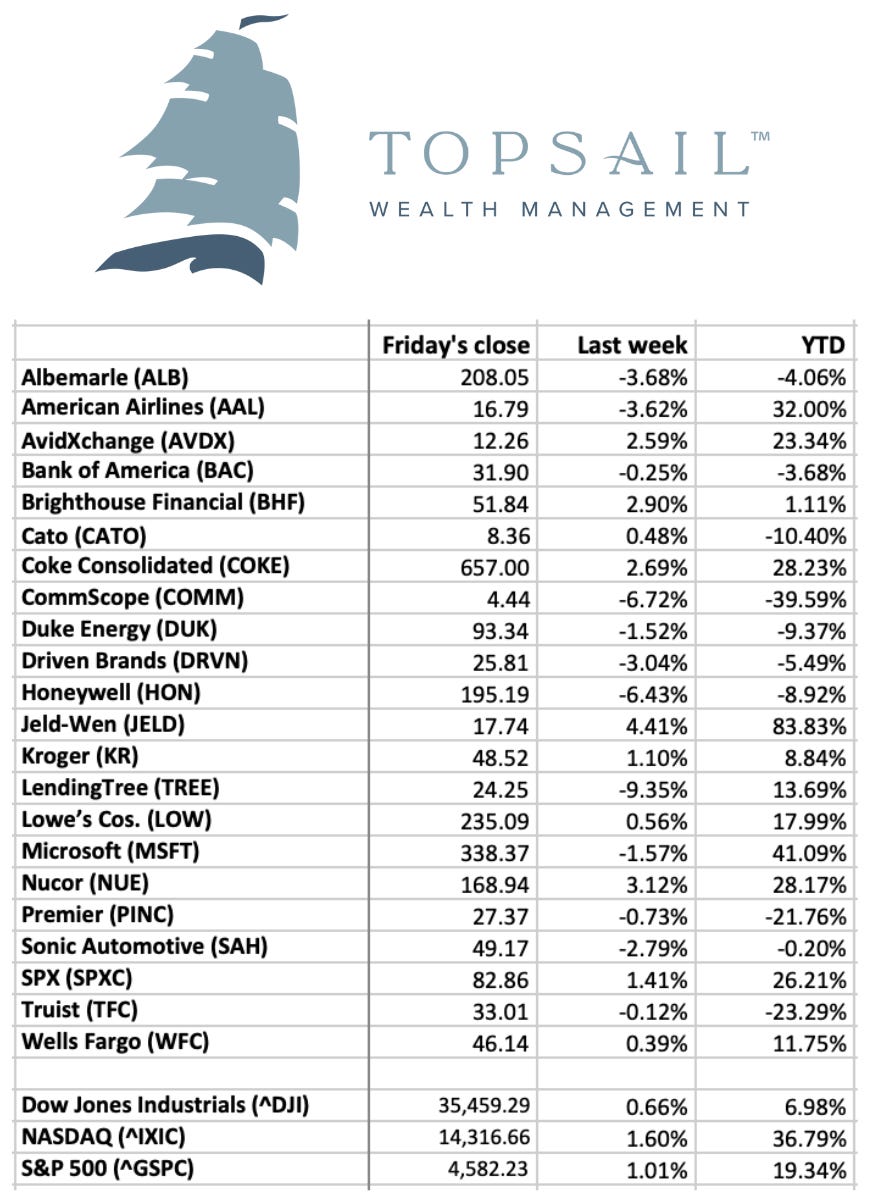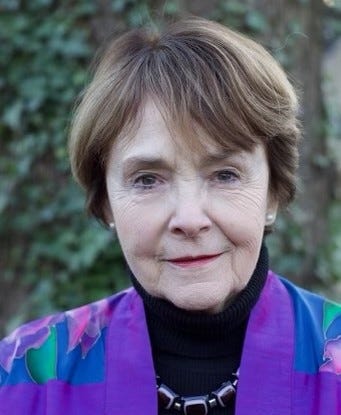High on hemp? N.C. cannabis shops sell ‘potent’ legal workaround
Plus: Elizabeth renovation reveals old facade; Concerts draw biggest crowds to uptown since 2019; Compass Group sued over diversity; Airport CEO says construction not intended as torture
Good morning! Today is Monday, July 31, 2023. You’re reading The Charlotte Ledger, an e-newsletter with local business-y news and insights for Charlotte, N.C.
The Ledger exists only because of the support of our readers. If you’re not a member, join today for full access and to allow smart and trustworthy journalism in Charlotte to grow. Details here.
Today's Charlotte Ledger is sponsored by Fox Rothschild, a national law firm whose Charlotte-based attorneys provide litigation, real estate, labor and employment, corporate and a wide range of other services to clients in the Carolinas and across the country.
Marijuana remains illegal in North Carolina. But growers and retailers have found legal alternatives that put users in a ‘nice spot’; ‘Lemon Drop’ joint recommended in SouthPark
[You might enjoy this article in its original audio format — it’s pretty good]:
Nick Davenport, who works at Blue Flowers in SouthPark, displays a jar of “Karma 20/20” hemp flower. He says customers are surprised they can “get this kind of stuff” in North Carolina. (Photo by Steve Harrison/WFAE)
by Steve Harrison
WFAE
In a two-story shopping center near SouthPark Mall, there is typical suburban retail: a nail salon. A T-Mobile outlet. A FedEx store.
And a place called Blue Flowers.
When you approach it, the first thing you notice is the smell.
“It’s almost like the scent trail of a pie hanging out in a window — you know, those little scent lines waving around,” said Nick Davenport, a Blue Flowers salesperson.
Blue Flowers sells hemp-based products, such as CBD oils. It also now sells gummies, hemp flower and pre-rolled joints.
It smells and looks like a California marijuana dispensary.
And what it sells produces the same psychoactive effects as marijuana, even though North Carolina is one of the most restrictive states when it comes to regulating that drug.
A bill to legalize medical marijuana is unlikely to pass the legislature this year. But the debate in Raleigh does not appear to be an issue for Blue Flowers and other dispensaries in Charlotte.
‘Same effects’ as regular marijuana
Davenport is standing in front of several large mason jars of hemp flowers, with names for different strains like “Bruce Banner” and “Karma 20/20.” There are gummies at the front of the store and pre-rolled joints by the register.
Davenport said people are stunned when they walk into Blue Flowers.
“One hundred percent. One hundred percent,” he said. “People come in here and are like, ‘I had no idea it was this far along.’ Often times people come in here and say, ‘I had no idea I could get this kind of stuff.’ People will realize they have a legal alternative to flower, and they stop going to their people, which is pretty fun.”
By “people,” he means “dealers.”
“That’s happened quite often,” Davenport said. “People tell us some pretty liberal things about what’s going on with them. And I’m like, ‘Cool, man, I’m glad we can get you something legal now.’”
When asked what pre-roll is best, Davenport pointed to one called a “Lemon Drop.”
“It has a nice citrus hint to the flower. Just a nice smooth smoke. And you’ll be in a nice spot afterwards, that’s for sure,” he said.
And with a $16 swipe of a credit card, the purchase is made. Davenport said customers can leave with a special receipt to let law enforcement know it’s legal.
The Lemon Drop, it turns out, does put one in a “nice spot” — which is a euphemism for, well, “high.”
And that’s true for what's sold at other stores as well, such Crowntown Cannabis, which has locations in NoDa and Plaza-Midwood; or GreenLife Remedies, with stores in South End and Pineville.
One woman, who asked not to give her name, says she spends about $200 a month on flower at GreenLife “just to mellow out a little bit and go on with my day.”
“Honestly, I like this stuff better (than marijuana), and compared to going to Denver (Colorado), the quality of it is pretty much the same,” she said. “I still get the same effects if I go to a state where it’s legal.”
‘Technically skirting around the law’
So how is this legal in North Carolina, where medical marijuana isn’t even legal?
The door was first opened in 2018, when the federal government removed all hemp products from its list of controlled substances, so long as it has less than 0.3% Delta 9 THC, the psychoactive component of marijuana.
Last summer, North Carolina lawmakers brought the state’s hemp laws in line with the federal regulations and specifically allowed all hemp derivatives.
After hemp laws were liberalized, growers began experimenting. They learned to extract psychoactive products from legal hemp that are slightly different from Delta 9 THC.
One is Delta 8, said Jessica Kruger with the University of Buffalo.
“What they usually do is spray this on bud or flower, and that will get you high,” she said. “But it’s not THC. It’s Delta 8 THC, which is a derivative. Now, it will cause you to be positive on a drug test. But it’s technically skirting around the law.”
Delta 8 has been in Charlotte since the coronavirus pandemic.
A newer arrival in Charlotte is THC-A, which is what a number of stores, like Blue Flowers, sell.
That hemp strain, by itself, does not have any psychoactive effects.
But when heated — through vaping or baking or smoking — it converts to regular THC, proponents say.
Phil Dixon with UNC’s School of Government, an expert on the state’s hemp laws, says the federal legislation “blew open the doors on hemp.”
“These are intoxicating hemp products that do cause impairment,” he said. “And they’re often sold alongside CBD products, and a hemp store that’s advertising CBD — they’re almost certainly carrying these products, too, and my sense is these are the most popular products these days.”
No age requirements for buying or possessing ‘potent’ hemp products
Dixon said the new hemp market has created what he calls “the Wild West” in North Carolina.
Though every CBD/hemp store I visited asked for proof of age before selling, there is no requirement they do so.
“There’s no age limit on this stuff,” Dixon said. “I have prosecutors calling me all the time saying, ‘Hey, I have a kid. I found him with a bag Delta 8 gummies in middle school, and I want to charge him.’ And it’s not a crime.”
What makes North Carolina even more strange is that it’s one of the most restrictive states when it comes to marijuana, but it’s one of the most liberal for hemp.
For instance, there are some states like New York where marijuana is legal, but where lawmakers have banned hemp-derivative Delta 8 in part because of safety concerns as to what’s in it.
N.C. Attorney General Josh Stein said the new hemp-based products are “potent.”
Stein, who sued the e-cigarette maker Juul over its marketing practices to minors, said there are vape stores near where his children went to high school in Raleigh.
“(They) are selling vapes with CBD in it and Delta 8 that has essentially 70% of the THC of marijuana,” Stein said. “There is not a law on the books in North Carolina that limits the age of one of these kids who can go buy one of these vapes.”
Democratic and Republican lawmakers introduced a bill in the House this year that would have placed some regulation on the state’s hemp business, though the bill appears to have stalled. Earlier this month, GOP House Speaker Tim Moore said a medical marijuana bill is dead because not enough members of his caucus support it.
Meanwhile, Blue Flowers is marketing beyond the chalkboards outside their stores.
It now has a billboard on Interstate 85.
Steve Harrison is a reporter with WFAE, Charlotte’s NPR news source. Reach him at sharrison@wfae.com. This article originally appeared on WFAE’s website and is republished with permission.
A renovation in Elizabeth uncovers a reminder of Charlotte’s past
Construction crews pulled the facade off the former Dollar General store on East 7th Street in Elizabeth last week and unearthed a treasure — the front of Stanley Drug Store, which occupied the building from 1934 to 1997. An article in the Charlotte Observer published when the building was sold in 1997 said Stanley Drug had offered an unusual mix of services, including a pharmacy, a lunch counter and a shoe department. Now, the property is being renovated again into a new retail center called Shops on 7th. (Photo by Christopher Lawing/Charlotte Signs Project)
Taking Stock, sponsored by Topsail Wealth Management
Topsail Wealth Management partners with you to provide personalized advice. Minimizing costs and the complexities of your wealth and investing plan.
How local stocks of note fared last week (through Friday’s close), and year to date:
Concerts draw biggest crowds to uptown in nearly 4 years
With the persistence of remote and hybrid work, uptown Charlotte might not be back to the full daytime vibrancy from before Covid. But uptown nightlife is.
Big-time concerts earlier this month helped draw the most people to uptown in nearly four years, according to stats from Charlotte Center City Partners.
In a LinkedIn post, the uptown advocacy group said there were 256,000 visits to uptown on Friday, July 14, and another 264,000 visits on Saturday, July 15. “Both days were the biggest in Uptown since December 7, 2019, when Clemson played Virginia in the ACC Football Championship,” the group said. The figures apparently stem from cell phone location data.
On July 14-15, country superstar Luke Combs played Friday and Saturday at Bank of America Stadium, rock band Blink-182 played Friday at the Spectrum Center, and Six the Musical was at Belk Theater on Friday and twice on Saturday. —TM
In memory: Eleanor Brawley’s legacy is the ‘Families of Abraham’ exhibit and book — and the cause of getting along
Eleanor Brawley, who died on July 3 at age 89, spoke to our better angels. In photographs, film, poetry and prose, she nudged us to embrace all God’s children. “Nudge” might not be strong enough, for Brawley never pulled punches in pursuit of what she believed.
Eleanor and her husband, Dr. Bob Brawley, lived in Charlotte for 44 years before she moved to Rhinebeck, N.Y., to be closer to loved ones. In a lifetime devoted to righteous causes, one of her last projects was her most ambitious.
She was the creative force behind “Families Of Abraham,” an exhibit and book of words and black-and-white photos chronicling the lives and faith of 11 families — Christian, Jewish and Muslim. The project, which debuted at Levine Museum of New South in Charlotte in 2006, was inspired by 9/11. We ponder 180 photos — Muslim midday prayer, baptisms, bar mitzvahs, kids playing soccer, families living their everyday lives — and ask ourselves, “In the ways that matter, aren’t we brothers and sisters?”
“Families of Abraham” was displayed at 12 venues, including Duke Chapel. When it was at Myers Park United Methodist Church in Charlotte, Brawley showed up to make sure each photo was hung just right. She stayed until they were.
Charlotte’s Adam Bernstein, whose family was featured in “Families of Abraham,” remembers her relentlessness in pursuit of a higher calling. As he put it, “Understanding and celebrating what we share and what differentiates us.” —Ken Garfield
You might be interested in these Charlotte events
Events submitted by readers to The Ledger’s events board:
TUESDAY: TFI's 2023 Parent and Community Talk: The Surprising Science of Attention, 7-8:30 p.m., Virtual via Zoom. Join us virtually for this free event happening via Zoom (link will be emailed before the event) where we’ll discuss: What attention is (and what it isn't); How to foster attention and discourage distraction; The best way to understand technology and attention. Free.
◼️ Check out the full Ledger events board.
➡️ List your event on the Ledger events board.
Corrections
An article in Friday’s newsletter about Charlotte airport rankings incorrectly stated the type of Airbus aircraft that operate at the airport’s B and C gates. American uses those gates to operate Airbus A321s seating about 190 passengers.
A photo caption in Saturday’s newsletter misspelled the name of organizational consultant and author Marie Kondo.
We try to get everything right, but occasionally we fall short. Our apologies.
In brief:
Ex-Compass Group employee sues after opposing diversity program: A former human resources employee of Compass Group is suing the Charlotte-based food service company in federal court, saying she was fired for opposing a corporate diversity program. The lawsuit, filed in the Southern District of California by a white woman who worked in San Diego, alleges that Compass had a program called “Operation Equity” designed to accelerate the careers of women and people of color with mentorship and “promised promotions.” She says she was fired for opposing the program and that Compass executives made statements including “This is the direction the world is going — jump on the train or get run over” and “We are not here to appease the old white man.” (Law.com, subscriber-only; Read the lawsuit)
Patagonia store headed to South End? Outdoor outfitter Patagonia appears to be targeting South End for its first store in North Carolina. Unnamed sources told the Charlotte Business Journal that it appears headed to an 11,000 s.f. space in Asana Partners’ Design Center formerly occupied by Byron’s South End. The company also created an Instagram handle that says “Coming soon to South End.” (Biz Journal, subscriber-only)
Moonshine confiscated at PNC concert: ABC law enforcement confiscated 38 jars of moonshine at May’s Dead & Company concert at PNC Music Pavilion, as well as wrote 15 tickets for “various alcohol and narcotics-related charges,” according to minutes from a June Mecklenburg County ABC Board meeting. The band is made up of former Grateful Dead members.
Higher tax bills arrive: Mecklenburg property tax bills started arriving in mailboxes on Friday and Saturday, leading to angry discussions about higher taxes on social media forums including Nextdoor, Reddit and Facebook. County officials have said 91% of residential owners should expect higher taxes this year, largely because commercial properties increased in value at a lower rate since the last revaluation in 2019. This year, the Charlotte City Council voted to approve a “revenue neutral” tax rate, while Mecklenburg commissioners voted to raise the tax rate above revenue neutral by 1.6 cents per $100 of assessed value ($16 per $100,000).
‘Booty’ haul: This weekend’s “24 Hours of Booty” charity bike ride to help people affected by cancer raised at least $1.57M, a spokeswoman told The Ledger on Sunday.
Soccer win, but no game this week in Charlotte: Charlotte FC won its first game since May 27 on Saturday, advancing to the Round of 32 in a tournament known as the Leagues Cup. It earned the right to a home game this week, but club officials said Bank of America Stadium is unavailable because of the upcoming Beyoncé concert, so the game will take place in Frisco, Texas, on Thursday instead. (Carroll Walton on Twitter, or do we have to call it “X” now?)
South End taco argument: The upcoming Netflix reality show “The Ultimatum: Marry or Move On” includes a few Charlotte couples deciding whether to stay together or separate. The trailer shows one of the couples “fighting outside of Hot Taco in South End,” Axios Charlotte reports.
JCC pickleball opening: The Sandra and Leon Levine Jewish Community Center opened six new pickleball courts on Saturday at a sold-out “Pickleball Grand Opening” celebration. A video posted to Instagram showed the courts being fully used and said: “Opening night was one for the books! We can’t wait for more action!”
Quotable: Charlotte airport CEO on unending construction: ‘I know people think we are torturing them’
Charlotte Douglas International Airport CEO Haley Gentry, in response to a question about the airport’s growth, on a recent episode of “Carolina Business Review”:
If we had 20 more gates in Charlotte, they’d be full tomorrow. …
In terms of how we plan and manage, our plans have plans. We’ve been planning for years. That’s something that we do really good.
I think the harder thing to do, and where we have really had to concentrate our effort, is how do you pivot that plan?
You talked about the construction. We do not have the luxury of closing our facility. I know people think we are torturing them. At times, when they come, [they might think] like, “Is this some sick game? That door was open yesterday! Now it’s closed today!”
I can assure you there is a method to the madness. Someone asked me once, “What happens when there’s no more construction?” We have a problem when there’s no more construction. The construction is not going to end as long as this region continues to thrive like it is.
Need to sign up for this e-newsletter? We offer a free version, as well as paid memberships for full access to all 4 of our local newsletters:
➡️ Opt in or out of different newsletters on your “My Account” page.
➡️ Learn more about The Charlotte Ledger
The Charlotte Ledger is a locally owned media company that delivers smart and essential news through e-newsletters and on a website. We strive for fairness and accuracy and will correct all known errors. The content reflects the independent editorial judgment of The Charlotte Ledger. Any advertising, paid marketing, or sponsored content will be clearly labeled.
Like what we are doing? Feel free to forward this along and to tell a friend.
Sponsorship information/customer service: email support@cltledger.com.
Executive editor: Tony Mecia; Managing editor: Cristina Bolling; Staff writer: Lindsey Banks








Your article on Eleanor Brawley omitted the fact the permanent home for her exhibition is in Shalom Hall at Myers Park Baptist Church. Thanks for the article. It's a beautiful exhibition.